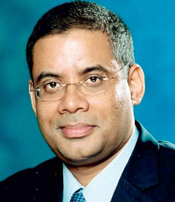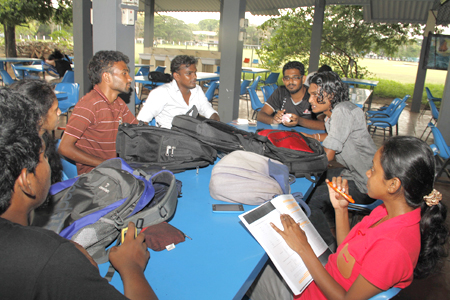Dearth of right-skilled people
First Human Capital summit in August:
Sri Lanka has the potential to become a high income economy through a
strategic focus on improving its human capital. Human capital needs to
be a strategic driver for inclusive economic growth to help the country
become a competitive player in Asia.
|

Dinesh Weerakkody |
However, educational attainment in Sri Lanka - which in the early 60s
was far better than even Malaysia or South Korea - has fallen way
behind, undermining the country's growth prospects.
"Sri Lanka needs a debate on improving its human capital through a
well-developed strategy; and education system.
We are in the process of organizing the country's first Human Capital
Summit on August 11 and 12; this will be inaugurated by Prime Minister,
Ranil Wickremesinghe where the PM will outline Sri Lanka's Human Capital
Strategy," Dinesh Weerakkody, a senior company director and a thought
leader in HR told the Business Observer in an interview.
Excerpts
What are the top challenges HR Managers face in their job today?
In discussions with HR professionals, I often start with a simple
question; 'What is the greatest challenge you face in your job today?'
Most of the answers are around things like: building credibility with my
line managers, managing the flow of talent (bringing in new people,
matching people to job, or removing people), handling employee
grievances, managing HR costs efficiently, and so forth.
These appropriate responses are now dated and need to move forward.
The HR profession has been through several stages; The administrative
work of HR, where HR focused on terms and conditions of work, delivering
HR services, and working on regulatory compliance; The design of
innovative HR practices in sourcing, compensation or rewards, learning
and communication; The connection of these practices to business success
through strategic HR; And using HR practices to derive and respond to
external business conditions.
Many of the responses I get to my query "what is your biggest
challenge" still target Stage 1 and Stage 2.
|

Employers see skills shortage as a major constraint and
question the quality and relevance of general education,
TVET and higher education. PICTURE: ANCL MEDIA LIBRARY |
HR professionals are consumed with the immediate hurdles they face in
doing HR work.
These are legitimate and relevant concerns. In recent conversations,
a number of senior HR executives have shared with me that HR has
forgotten these basics and without doing the basics well, the
aspirations of business contribution remain an unrealized dream.
In most companies, the HR manager is employed to help translate
business strategy into the daily actions of people; but often the
results are not very effective. Why?
To connect HR to the broader business context in which business
operates is the key challenge for HR.
That needs HR to build credibility with line managers so that HR can
make better decisions that help the business reach its goals so that
they can anticipate and respond to external business conditions and
deliver value to customers and investors.
By doing this, HR professionals shift from an inside/out to an
outside/in approach to HR work.
HR no longer creates value by simply serving employees, but by making
sure that services the company offers inside the company is aligned to
the expectations outside the company.
For example, a company would aspire to be the employer of choice of
employees the customers would choose. Every HR practice can be
transformed by seeing the value that it creates for those outside the
company. This positions HR, to not just respond to strategy, but to help
shape and create it.
What are the hurdles Sri Lanka has to overcome in its forward march?
Learning outcomes in primary and secondary education are still very
low; and show disparities by location, parental income and school
streams. Only 25% of young people coming out of secondary education go
for higher education, where access is very low and inequitable; Of which
a large share of students is in humanities and arts relative to
sciences/engineering (50% vs. 17%); a great variation in quality and
abysmal quality of external degree programs (40% of total enrollment).
Another 30% enroll in TVET with low quality and relevance to market
needs, while the remaining 45% will have no opportunity to acquire
further job-specific skills (except on the job market).
Employers see skills shortage as a major constraint; and question the
quality and relevance of general education, TVET and higher education.
If we are to move forward, we need to address several issues; the
national education strategy needs to take into account that skill
building is a continuous process starting from early childhood: Skills
beget skills along the life-cycle. Simply looking at the end of the
education cycle may not help our country in the long term. Broadly; we
need to focus on improving quality.
For instance:
* Primary and Secondary Education: focus on improving quality.
* International benchmarking needed: participate in international
assessments to assess quality gap and monitor progress over time.
* Investment in teacher quality. Not more teachers, but teachers with
the right expertise; recruit on merit; redeploy according to needs (with
incentive package if needed). Motivate teachers (revision of pay scales,
career progression; reward performance).
* Increase availability of science and technology streams in
secondary schools
* Strengthen quality assurance and school-based management by
increasing parental and community involvement.
* Provide more information and career guidance to students about
possible future studies and career opportunities.
* Technical and Vocational Education and Training (TVET): Make it
relevant. Ensure private sector participation in definition/updating of
standards, course contents, training of instructors, apprenticeship
opportunities.
* Build capacity for labour market analysis and assessment of
employers.
* Expand quality control (registration/accreditation) to cover public
and private providers.
* Try out vouchers schemes/purchasing of private sector services on a
pilot basis, evaluate before scaling up. Ensure prior dissemination of
information about performance of centers and job prospects to guide
students decisions.
* Strengthen coordination between the various relevant Ministries and
institutions providing TVET through an Inter-Ministerial Skill
Coordination Committee.
* Higher Education: upgrade
Increase university intake in priority degree programs.
Introduce scholarship schemes for junior academics in priority
disciplines; consider appointing international faculty as needed. (to
address the severe faculty shortage).
Introduce PPPs to stimulate development of accredited private
national and international institutions.
Ensure competitive funding of research.
How do you look at the HR culture in the State sector? What are the
issues and solutions?
A: Are we investing sufficiently to develop public sector capacity?
The answer is no. The transformation of the Public Services is a must.
It will help ensure that the public services deliver value to citizens
and residents of the country. The government should operate efficiently
and effectively.
It should be an institution that has a clear sense of purpose, vision
and values. It should be an institution whose purpose, vision and values
are formulated to enhance the well being of its collective internal and
external stakeholders.
It should also be an institution that translates its purpose, vision
and values into reality through effective leadership and HR development
policies and practices. At another level, the ability of Civil Service
to reform helps shape an overall identity for Sri Lanka.
The government becomes an example of not only how government works,
but also how the broader society can and should function including the
private sector and social institutions (NGOs). A company and a nation
may have an identity or 'brand' that infuses itself throughout a
society.
This brand defines what the country is known for; how it builds on
its past to prepare for its future; how it innovates; how it governs,
makes decisions, and allocates resources; how it develops human
capability; and how it turns values and beliefs into actions and
practices through people and organization. Sri Lanka needs to prepare
the country for the present as well as for the future generations; it
must define its economic future and create human capital that can
accomplish that future.
We are an aging population. Shouldn't we let people work at least
till 65?
We need to find new ways of tapping into that experience pool without
disrupting the culture of the work place.
In the present corporate culture, we talk a lot about HR and
Sustainability. Sustainable business practices precede sustainable
business culture. How do we achieve this?
I agree with you. Sustainable business practices precede sustainable
business culture. Embedding a sustainable culture is the responsibility
of HR. Its role in supporting sustainability is, therefore, three-fold.
First, it must ensure that a sustainable approach to managing
employees is part of business strategy. Employee health and safety,
work-life balance, diversity and inclusion, gender equality, hiring and
firing practices, fair rewards, a living wage, employee learning and
growth, positive internal communications, open dialogue and employee
involvement in the community are all themes that are part of sustainable
business practices.
Secondly HR must realign key HR practices to adapt to the principles
of sustainability. Thirdly, get leadership support to implement the HR
agenda. To me, sustainability begins at home, and HR's first role is to
ensure that a company manages its employees in a sustainable way. A
truly sustainable business is created when all employees are aware of
how their roles contribute to the sustainability agenda. |

